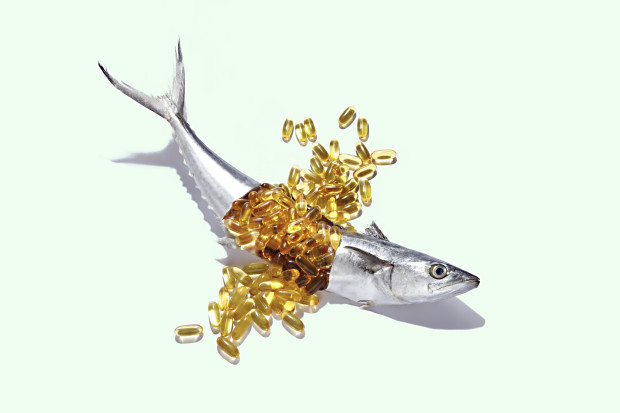You know a supplement has reached the mainstream psyche when your social feeds are flooded with info about fish oil benefits for men. But has it earned all the buzz?
“Fish oil has long been touted for its reported health benefits, but it’s unclear if this hype is warranted,” says Kim Yawitz, RD, a registered dietitian in St. Louis, MO. “We know it’s a good source of omega-3 fatty acids, and there’s evidence that people with higher levels of these fats may have healthier hearts and brains.” However, she adds, it’s uncertain if these benefits come from fish oil supplements or because people who take them tend to be more health-conscious in general (e.g. big seafood eaters or those on the Mediterranean diet.)
Ahead, find out what you should know about its potential benefits, if you should supplement with it, and its potential side effects.
What Is Fish Oil?
Before we get into omega-3 fish oil benefits for men, you may be wondering what fish oil is. It’s derived from the solid and liquid fat found in the tissues of fatty fish like anchovies, herring, mackerel, salmon, tuna, and more, says Yawitz.
Fish oil is “an excellent source of DHA and EPA, not from the fish themselves but from microalgae further down the food chain,” she continues, noting that these omega-3s accumulate in the fat and liver of fish as they eat smaller organisms like phytoplankton and are later extracted to make fish oil supplements. However, Yawitz says, the best way to ensure you’re getting enough DHA and EPA is to consume about eight ounces of fatty fish weekly, like the ones mentioned above. (You can also check out the top 10 fish proteins.) But supplements can help bridge any nutritional gap if you don’t eat a lot of seafood.
Fish oil derives its benefits from these omega-3 fatty acids, says Molly Snyder, RDN, LDN and owner of Full-Filled Nutrition, based in Pennsylvania. This is thanks to omega-3s keeping “the membranes surrounding all cells working well,” she says, noting that omega-3 fatty acids have a positive effect on virtually your whole body by way of their anti-inflammatory properties.
Omega-3 fatty acids comprise a group of polyunsaturated fats that help make up cell membranes, and also provide energy for the body and control inflammation. The omega-3 fish oil benefits for muscle activity and cell growth also enhance memory, brain function, and heart health.
Shana vak/Getty Images
There are three types of omega-3 fatty acids:
- alpha-linolenic (ALA)
- eicosapentaenoic acid (EPA)
- docosahexaenoic acid (DHA)
“ALA is found primarily in plant foods and plant oils such as flaxseed, nuts, legumes, soybean, and canola oils. DHA and EPA are found in fish and seafood sources,” she says.
How to Safely Supplement With Fish Oil
Omega-3 fish oil supplements are not regulated by the FDA, so the ingredients presented on a supplement bottle's label may be incorrect, says Catherine Karnatz, MPH, RD, Rhode Island-based dietitian and creator of Nutrition Education RD. “A food-first approach is the best way to reap the nutritional benefits of omega-3 fatty acids in fish oil.” However, here's how to effectively supplement your diet with fish oil.
Fish Oil Dosage
There’s no official recommendation for how much to take daily in order to reap the fish oil benefits for men, but Yawitz says: “I typically recommend around 1,000mg of combined DHA plus EPA daily for my clients who don’t eat fish.”
Yawitz notes that while amounts vary by fish species, many popular types of fish have between 1,000 and 2,500mg of DHA and EPA per 3.5-ounce serving; for instance, a 3.5 ounce serving of mackerel provides about 2.5 grams of DHA and EPA and 3.5 ounces of pink salmon has around 1,000mg of DHA and EPA.
“Doses lower than this may not raise omega-3 levels enough to lower the risk of chronic disease, while doses much higher than this increase the likelihood of side effects.”
DHA and EPA Concentration
When you scan omega-3 fish oil supplement labels, pay attention to the breakdown of nutrients as a “supplement with 1,000mg of fish oil may only have 200 to 300mg of DHA and EPA,” says Yawitz, as the omega-3 content varies by brand. Look for 500mg of each.
Fish Oil Timing
Take the supplement with meals that already include healthy fats, says Yawitz. Research shows that this significantly improves absorption of the DHA and EPA.
Supplement Freshness
Fish oil capsules stay relatively fresh at room temperature. Some people freeze them because it reduces "fish burps." If you have fish oil in liquid form, refrigeration is recommended because it's more exposed to the air than the capsules.
Talk to Your Doctor
As with any supplement, “always consult with a healthcare provider before adding fish oil supplements into your lifestyle, as the nutritional quality may vary immensely from brand to brand,” says Karnatz. If you decide to take fish oil with a qualified healthcare professional’s approval, Karnatz says to opt for brands that have been third-party tested and NSF certified to ensure you're only consuming the ingredients that are listed on the product's bottle.

Enn Li Photography/Getty Images
What Are the Risks and Side Effects of Fish Oil?
Most supplements have 1,000mg to 1,500mg of fish oil per serving. You’re probably going to stay within a safe range of fish oil if you stick to the instructions on the label since “healthy adults can safely take up to 5,000mg of combined DHA plus EPA daily,” says Yawitz. Side effects like nausea, fish-flavored burps, diarrhea, and headache, are more common with higher doses.
For some, that queasy moment of a fish-infused burp is enough to stop taking fish oil supplements. But experimenting with various brands can relieve you of that phenomena. Algae-based vegan omega 3 supplements are now also on offer and may have less of that funky aftertaste.
“Omega-3s can also interact with certain drugs, including anticoagulants, blood pressure medications, and vitamin E,” says Yawitz, so consult with a doctor before switching up your supplements or adding something new.
And if you’ve ever had surgery, you may recall that your doctor may have instructed you to stop taking omega-3 supplements for several days before your operation, says Yawitz. “This is because omega-3s thin the blood, making you more susceptible to heavy bleeding,” she says. “This risk is higher with large doses and may cause spontaneous bleeding from the nose and the gums, especially.”
How Fish Oil Helps Memory
One of the most impressive fish oil benefits for men and women alike is its potential to help support brain health. Research on adults 65 and older supports omega-3 fatty acid supplementation for cognitive performance, says Snyder. That doesn’t mean it’s a cure-all. And that doesn’t mean if you’re, say, a 25-year-old healthy male and take fish oil now, that it will necessarily do anything for your future cognition.
With that in mind, there’s some evidence that DHA and EPA may help protect against memory loss, Alzheimer’s disease, and dementia, says Yawitz. t surprisingly “it’s unclear whether fish oil supplements are as beneficial as just eating fish,” so for those who consume fatty fish regularly, there may not be any point in shelling out more money on supplements for potential omega-3 fish oil benefits.
“Observational studies have shown that adults with Alzheimer’s disease are more likely to have low DHA levels than those with healthy brains and that people with higher levels of DHA may have more brain mass in areas of the brain responsible for memory,” says Yawitz. “Studies have also linked higher intakes of DHA-rich foods with a lower risk of dementia and Alzheimer’s disease,” she continues, with the caveat that results from randomized controlled trials, the gold standard in supplements research, have been mixed.
Recent clinical trials suggest DHA and EPA supplements may improve learning, memory, cognitive function, and blood flow to the brain. However, ”in older studies, fish oil supplements were no better than a placebo for improving memory,” Yawitz says.
Is Fish Oil Good for Sperm and Fertility?
One of the fish oil benefits for men that gets a lot of buzz is how it may impact your swimmers. “Fish oil contains omega-3 fatty acids and vitamin A—both of which are associated with better semen quality,” says Yawitz, who points to a 2020 study, in which healthy young men taking fish oil supplements had higher semen volume and larger testicles than men who didn’t take them, and these differences were greater in men who took fish oil more consistently. “Men who regularly used fish oil also had lower levels of follicle-stimulating hormone and luteinizing hormone—two chemicals that have been linked to testicular failure in large amounts,” she notes.
Snyder also references this a study that showed supplementation of omega-3 sources improved sperm and fertility parameters in men after four weeks of appropriate supplementation in a male diet.
The bottom line is more research needs to be done. If you have male factor infertility concerns, book an appointment with a urologist. Although these findings are promising, there haven’t been enough large clinical trials to know how fish oil impacts fertility, says Yawitz. “Taking fish oil probably won’t hurt if you and your partner are trying to conceive, but there’s no guarantee it’ll help, either,” she says.

Per Breiehagen/Getty Images
Does Fish Oil Increase Stamina?
Among the fish oil benefits for men, the jury’s still out on whether supplements can lead to enhanced stamina, both on the field and in the bedroom.
“Fish oil supplements are popular among athletes, thanks to mostly anecdotal reports that taking them can lower inflammation, boost recovery, and improve endurance,” says Yawitz. “But overall, there’s not a lot of evidence that fish oil supplements increase stamina.”
Snyder adds that there are few research studies done on stamina and omega-3 fatty acids, though many studies speak to various markers of athletic performance that all contribute to stamina. Nevertheless, some data indicates fish oil supplements may play a role in supporting athletic endurance. A meta-review of 25 years of scientific research evaluated literature on amateur athletes with short-term use of supplementation. “Evidence supports the role of EPA and DHA in improved performance for endurance, functional response to exercise and enhanced recovery in amateur athletes,” she says.
And fish oil supplements aren’t likely to transform your sex life, but they may have some effect. One cross-sectional study examining more than 1,600 young men in Denmark found that participants regularly taking fish oil supplements over a three-month span had higher testosterone levels than those that did not supplement with fish oil pills. However, limited concrete evidence currently exists to support a direct association between adequate testosterone levels and greater sexual stamina in males. “A variety of other contributing factors may account for insufficient testosterone levels in men,” Karnatz says.
Embracing that food-first nutrition philosophy, Yawitz does underscore that fish itself is a great source of protein, “a nutrient that may help increase stamina in strength and endurance athletes.”
Does Fish Oil Increase Beard Growth?
If you’re looking to fill out your beard, you may have considered reaching for fish oil vitamins. But should you? “Fish oil could help increase hair growth, possibly by increasing blood flow and nutrients to the hair follicles,” says Yawitz, sharing that in these studies, adults taking fish oil had more hair growth and less hair loss than those given a placebo. The caveat: “ne of these studies have focused on beard growth, specifically, and most have been conducted on women and rodents,” she says. If this is one of the main benefits of fish oil you’re hoping to reap from omega-3 fish oil supplementation, save your cash.

